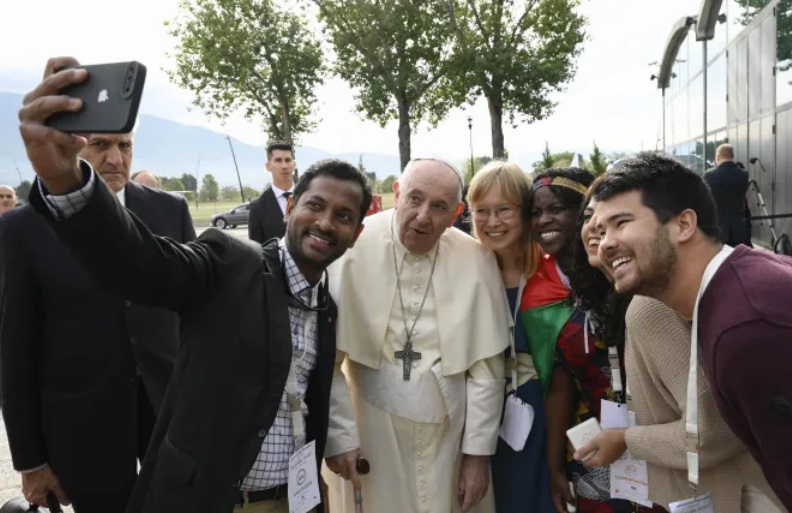Help the poor and the planet, pope tells young economists, entrepreneurs
Acknowledging how young people have been given a world marked by inequality, injustice, war and environmental degradation, Pope Francis urged those looking for solutions to be concrete, to involve the poor, to care for the Earth and to create jobs.
Oct 07, 2022

By Cindy Wooden
Acknowledging how young people have been given a world marked by inequality, injustice, war and environmental degradation, Pope Francis urged those looking for solutions to be concrete, to involve the poor, to care for the Earth and to create jobs.
“Our generation has left you with a rich heritage, but we have not known how to protect the planet and are not securing peace,” Pope Francis told some 1,000 young adult economists, entrepreneurs, financial advisers, students, scholars and scientists from 120 countries at the closing session of the Economy of Francesco event in Assisi.
The Sept 22-24 gathering was originally planned for March 2020 but was postponed because of the COVID-19 pandemic. Instead, the young people spent more than two years working online with older experts, studying agriculture and employment, peace and ecology and finance and development in the search for ways to make the economy better, for more people and for the environment.
The project is named in honour of St Francis of Assisi, known for his love of the poor and of creation, and has been supported by the Dicastery for Promoting Integral Human Development.
At the end of the meeting, participants gave Pope Francis a pact, promising to work for “an economy of peace and not of war; an economy that counteracts the proliferation of weapons, especially the most destructive ones; an economy that cares for creation and does not plunder it; an economy at the service of the person, the family and life, respectful of every woman, man, child, the elderly and especially the frail and vulnerable.”
The Pope encouraged the young people also to dedicate themselves to preserving and increasing their “spiritual capital,” the faith and values that will give meaning to their studies, their work and, especially, to their lives.
After all, he said, “human beings, created in the image and likeness of God, are seekers of meaning before being seekers of material goods,” but the modern world is losing sight of “this essential kind of capital, accumulated over centuries by religions, wise traditions and popular piety.”
Inspired by St Francis of Assisi, he said, a new economic model must be “an economy of friendship with the earth and an economy of peace. It is a question of transforming an economy that kills, into an economy of life, in all its aspects.”
Love for the poor and for the earth must go hand in hand, he said. But it will require sacrifice and radical change.
“The earth is burning today,” he said. “If we speak of ecological transition but remain in the economic paradigm of the 20th century, which plundered the earth and its natural resources, then the strategies we adopt will always be insufficient.”
“We human beings, in these last two centuries, have grown at the expense of the earth. We have often plundered to increase our own well-being, and not even the well-being of all,” Pope Francis told the young people. “Now is the time for new courage in abandoning fossil fuels to accelerate the development of zero- or positive-impact sources of energy.”
When the Pope arrived at the gathering, young adults from Italy, Benin, Argentina, Thailand, Kenya, Afghanistan and Poland shared their stories and projects — from creating farms and educating farmers in regenerative agriculture to creating small businesses or rallying other young people to convince companies to stop producing single-use plastic bottles and bags.
Andrea, a young Italian in jail for murder but given permission to attend the Assisi event, spoke about his digital marketing work through a prison-based cooperative, which provides remote workers for companies as well as a workshop for repairing espresso machines for coffee bars.
“I am not an economist, but it seems quite logical to me to think that prison, in order to be a good investment for society, must achieve concrete results, and these are basically two: security and zero recidivism,” Andrea said. “People coming out of prison must be changed and transformed from a ‘cost item’ to a ‘resource’ for society.” --CNS







Total Comments:0